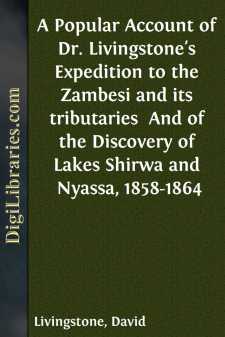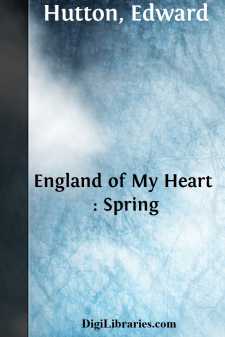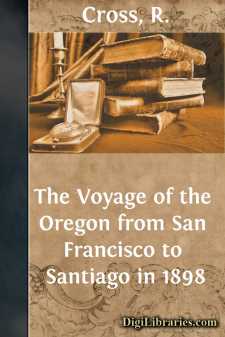Travel
- Africa 29
- Alaska 3
- Asia 46
- Australia & Oceania 26
- Canada 31
- Caribbean & West Indies 5
- Central America 1
- Europe 151
- General 39
- Maps & Road Atlases 1
- Mexico 10
- Middle East 18
- Polar Regions 7
- Reference 11
- Restaurants 1
- Russia 6
- South America 16
- United States 71
Travel Books
Sort by:
by:
Budgett Meakin
PART I I "The firmament turns, and times are changing." Moorish Proverb. By the western gate of the Mediterranean, where the narrowed sea has so often tempted invaders, the decrepit Moorish Empire has become itself a bait for those who once feared it. Yet so far Morocco remains untouched, save where a fringe of Europeans on the coast purvey the luxuries from other lands that Moorish tastes...
more...
PREFACE. It has been my object in this work to give as clear an account as I was able of tracts of country previously unexplored, with their river systems, natural productions, and capabilities; and to bring before my countrymen, and all others interested in the cause of humanity, the misery entailed by the slave-trade in its inland phases; a subject on which I and my companions are the first who have...
more...
Introduction. In the following pages I have endeavoured to describe all that appeared to me most important and interesting among the events and the scenes that came under my notice during my sojourn in the interior of Africa. If my account should not entirely harmonise with preconceived notions as to primitive races, I cannot help it. I profess accurately to describe native Africa—Africa in those...
more...
I A WEEK IN JAPAN The Pacific Ocean was very kind to us, for it answered to its name, and was pacific beyond all our expectations. Sixteen days of smooth seas and lovely weather brought us by way of Honolulu to Yokohama. Only the last day of our voyage was dark and rainy. But though the rain continued after our landing, Japan was picturesque. On four out of our six days we drove about, shut up in...
more...
PREFACE Said a friend of mine to me some months ago: “Well now, why don’t you write a sensible book? I should like to see you make people think.” “Do you believe it can be done, then?” I asked. “Well, try,” he replied. Accordingly, I have tried. This is a sensible book. I want you to understand that. This is a book to improve your mind. In this book I tell you all about...
more...
SOUTHERN CALIFORNIA Nature has carefully guarded Southern California. Ten thousand miles of ocean roll between her western boundary and the nearest continent; while eastward, her divinity is hedged by dreary deserts that forbid approach. Although the arid plains of eastern Arizona are frequently called deserts, it is not till the west-bound tourist has passed Flagstaff that the word acquires a real and...
more...
CHAPTER I. EMBARKATION FOR CANADA. — VOYAGE OUT. — SEA-LIFE. — ICEBERGS. — PASSAGE UP THE ST. LAWRENCE. — QUEBEC. — MEMORIALS OF GENERAL WOLFE. — CATHEDRAL. — HOSPITALITY. — EARTHQUAKES. — NUNS. — MONTREAL. — PROGRESS UP THE COUNTRY. — MY ROMAN CATHOLIC FELLOW-TRAVELLER. — ATTEMPT AT CONVERSION. — THE TOWNSHIP OF WHITBY. A PREFERENCE for an active, rather than a...
more...
by:
Edward Hutton
CHAPTER ITHE PILGRIMS' ROAD TO CANTERBURYFROM THE TABARD INN TO DARTFORDWhen I determined to set out once more to traverse and to possess England of my heart, it was part of my desire first of all to follow, as far as might be, in the footsteps of Chaucer's pilgrims. Therefore I sought the Tabard Inn in Southwark. For true delight, it seems to me, a journey, especially if it be for love or...
more...
by:
Jacob Abbott
The Fame of Geneva. Geneva is one of the most remarkable and most celebrated cities in Europe. It derives its celebrity, however, not so much from its size, or from the magnificence of its edifices, as from the peculiar beauty of its situation, and from the circumstances of its history. Geneva is situated upon the confines of France, Switzerland, and Sardinia, at the outlet of the Lake of Geneva, which...
more...
by:
R. Cross
To the Reader ALMOST ten years have passed since the country followed, in scanty telegram from port to port, the Oregon speeding down one side of a continent and up the other to Bahia; then came two anxious, silent weeks when apprehension and fear pictured four Spanish cruisers with a pack of torpedo boats sailing out into the west athwart the lone ship's course, the suspense ending only when...
more...











